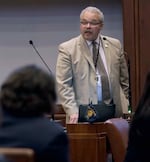This time last year, Oregon lawmakers came tantalizingly close to passing Senate Bill 1583 before it died last minute.
The 2024 bill would have blocked school boards and other school officials from removing or refusing to offer library books or textbooks simply because they contain the perspective of, or are written by, members of protected classes, such as people of color, LGBTQ+ individuals or religious minorities.
As Sen. Lew Frederick, D-Portland, put it in a hearing this week, lawmakers were “an hour and a half from getting it passed.” Instead, the bill — which passed the Senate on a party-line vote — got stuck in committee on the House side as Republican delay tactics effectively ended the legislative session early.
This year, Senate Bill 1098 is picking up the torch.
What proponents are calling the “Freedom to Read” bill would prohibit book bans and other forms of censorship in Oregon public schools if the attempt constitutes discrimination. That means a book couldn’t be banned based on race, national origin, color, sex, gender identity, sexual orientation, age, religion, physical or mental disability, military status, or marital or family status. The bill had its first hearing Monday morning.
The bill prohibits discrimination as defined by existing state law when government authorities make decisions about textbooks, instructional or program materials, and library books used in Oregon’s public schools.

Julia Alvarez's novel 'How the García Girls Lost Their Accents' sits on a shelf at the Salem Public Library on Sept. 19, 2024. In August 2024, the Tillamook School Board voted to remove the novel from Tillamook High School’s 10th-grade honors English curriculum.
Natalie Pate, Natalie Pate / OPB
Book ban efforts have rapidly increased locally and across the country, according to the State Library of Oregon, often led by a small minority. In recent years, Oregon has faced the most challenges to school and library books in state history. State trends mirror national ones: the books under attack are often by or about people of color, women and LGBTQ+ communities.
Several groups and Democratic lawmakers are backing Senate Bill 1098, including ACLU Oregon, the Oregon Education Association, Latino Network, Basic Rights Oregon and Parents Defending Schools and Libraries.
Proponents argue that when books and materials are banned or censored, it erases the history and lived experiences of marginalized groups and silences important lessons and discussions about culture and identity.
“Gilgamesh, the Bible, Homer, Mark Twain, Toni Morrison,” Sen. Frederick listed in his testimony for the bill, “Octavia Butler, Isaac Asimov, Shakespeare, Cicero and Dr. Seuss all have sections in their writing that will offend someone, but that’s not the reason to stop reading them.
“It’s also not the reason to tell other people to not read them.”
Frederick spoke to the Senate education committee, which he chairs, early Monday morning as a chief sponsor of Senate Bill 1098.

Sen. Lew Frederick, D-Portland, on March 1, 2024, at the Capitol in Salem, Ore. Frederick is among the proponents of legislation that fell short of passing in 2024, but is back in 2025, to stop schools from banning books for discriminatory reasons.
Kristyna Wentz-Graff / OPB
“That’s the whole idea of learning, reading, discussing, understanding, finding out about other humans,” he said. “What we don’t want to see in education is a narrow view of what the world looks like, when, in fact, the world is much larger than many of us ever thought.”
Support for the bill
More than 100 people have already shared their thoughts on the revamped bill. There’s a mixed bag of support and opposition, with about a quarter of the submitted testimony speaking against it.
Those who support it say the bill protects First Amendment rights, key foundations of democracy, school expertise and resources, and student wellbeing and academic success.
Bridget Tyler is a mother and writer from Corvallis. She testified in favor of the bill, she wrote, because “the future of our state, our country, and our planet rests on raising well-educated young people who are both well-informed and willing to discuss ideas, whether they agree with them or not.”
Tyler said she and her daughter came face-to-face with censorship efforts recently when some local parents objected to the musical planned for her daughter’s school. Tyler concluded that young people appreciate being given the opportunity to explore difficult issues with the support of adults, rather than having them strictly forbidden.
“I think we owe it to all of the children of Oregon to create an environment in which they are educated and trusted,” she wrote, “so that they, in turn, can trust us.”

Julia Alvarez's novel 'How the García Girls Lost Their Accents' at the Salem Public Library on Sept. 19, 2024. The Tillamook School Board voted to remove the book from Tillamook High School's 10th-grade honors English curriculum last summer.
Natalie Pate, Natalie Pate / OPB
Finn Johnson spoke in favor of the bill on Monday, offering his perspective as an educator and advocate who is transgender. He argues that part of participating in a democracy is that we should be exposed to varying viewpoints and learn to respect them — even if they’re not the viewpoints we hold ourselves.
Johnson told OPB that arguments against the bill sound similar to defenses of school segregation in the mid-20th century. Now, America is facing another tipping point.
“We don’t want to move backwards in history,” he said, “at least I don’t. I only want to move forward. And I think that allowing a minority group of people who hold specific and sometimes vilifying opinions about marginalized groups shouldn’t impact school curricula.”
Opposition to the bill
Those who oppose the bill largely argue parents should be the ones to decide what their children can read. They argue there is vulgar material currently offered in schools that is not age-appropriate. Some feel public schools may be pushing an agenda they don’t want their children exposed to.
“There needs to be common sense here,” wrote Dianne Lamb in her testimony to the legislature. “We can’t continue to push perversion in our schools and expect that people will remain OK with it. It is astonishing what our schools have become. Get your kids out of these indoctrination centers.”
J Trimble from Roseburg submitted testimony on behalf of Moms for Liberty Douglas County. Moms for Liberty is a national parents' rights organization and has been heavily involved in book and curriculum restriction efforts. The Southern Poverty Law Center and others identify Moms for Liberty as a “far-right” antigovernment organization.
“Yes, parents can opt their children out of certain books and materials, but that rarely happens as most parents do not know what is in their children’s textbooks or libraries openly available to them,” Trimble wrote. “Removing obscene, offensive or non-age-appropriate materials is not discrimination against any class of individuals but keeping children’s innocence, and schools should already be actively doing that.”

Oregon State Representative for House District 44 Travis Nelson (left) and Portland Public Schools Board of Education Chair Gary Hollands (right) at Cesar Chavez School in Portland on August 29, 2023. Nelson is a co-sponsor of Senate Bill 1098, a bill that would prohibit book bans and other forms of censorship in Oregon public schools if the attempt constitutes discrimination.
Caden Perry / OPB
Rep. Travis Nelson, D-Portland, one of the many co-sponsors of the bill, testified Monday morning, responding to some of the concerns from those opposing the bill. He described the bill as a legal formality but a necessary step.
“We do have laws that require an inclusive selection of instructional materials, and generally we prohibit discrimination in education,” Nelson explained. He added later that the bill does not mandate what materials are presented.
The bill still allows parents and guardians to request to remove books, he said, and school administrators are free to consider those requests. If passed, the bill also will not prevent school boards or staff from considering age appropriateness, obscenity and educational value in selection decisions, which they already do.
“This legislation is a clear statement of our values as Oregonians,” Nelson said, adding that he was testifying as an openly LGBTQ+ Black man. “It embodies our commitment to creating an educational environment where every student can learn and grow and see themselves reflected in the stories and histories that shape our world.”
